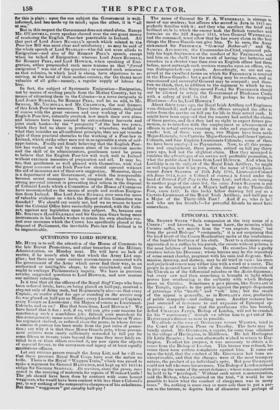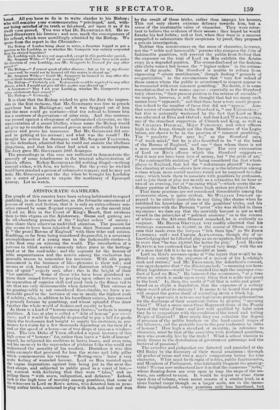EPISCOPAL TYRANNY.
MR. SYDNEY SMITH "feels compassion at the very name of a Curate ;" and knowing, as he must know, the miseries which Curates suffer, not merely from the " res angusta demi," but from the proud Bishops' " contumely," it is not surprising that the kind heart of the Canon Residentiary melts at the misfortunes of the humbler brethren of his cloth. Next to a chimney-sweep apprenticed to a ruffian by his parish, the curate without patrons is the most helpless of human beings. He crouches like a guilty creature before his Diocesan ; whose bureau may be the repository of some secret slander, pregnant with his ruin and disgrace. Sub- mission, fawning, and flattery, may be all tried in vain : his stern and prejudiced censor may wither hint with a word or a sneer. The people in general know as little of the internal administration of the Church as of the differential calculus or the SEolic digamma ; but every now and then something is brought to light which proves how overbearing is the authority with which Bishops press on Curates. Sometimes a poor parson, like Rows.sse of the Temple, appeals to the public against the purple dispensers of patronage who "hustle" and "rob" bins ; but the result of the appeal is generally, as in RowLAris case, productive of public sympathy—and nothing more. Another instance has just occurred of resistance to and exposure of Episcopal op- pression : and we hope that the gentleman who has bravely defied CHARLES ,TAMES, Bishop of London, will nut be crushed for his " contumacy;" though Ire advise him to get out of Dr. 13Lommtn's diocese as soon as possible. We allude to the case of GOMPERTZ versus WESTON, tried in the Court of Common Pleas on Tuesday. The facts may be briefly stated. Mr. GONIPERTZ, a curate, for some time officiated in the village of Harlington, in Middlesex. He left Harlington flhi Little Bromic) ; but soon afterwards wished to return to Har- lington. To effect his purpose, it was necessary to obtain a li- cence front the Bishop of Loudon. This licence was refused, be- cause there were certain complaints against him. It came out upon the trial, that the conduct of Mr. GOMPERTZ had been un- exceptionable, and that the charges were of the most trumpery nature, the product of an individual's spite. But poor GOMPERTZ
could not tell who were his accusers. The Bishop of London refused to give up the name of the secret defamer ; whose communications he held to be "privileged." Without such secret communication,
said the Bishop, when examined on the trial, " it would be im- possible to know what the conduct of clergymen was in many cases." So, nothing is more easy or more safe than to put a par- son to the torture, to deprive him of character and perhaps of bread. All you 'have to do is to write slander to his Bishop; who will consider yam communication " priyileged," and, with- out being satisfied of its truth or falsehood, act upon it as if its truth were proved. This was what Dr. BLOMFIELD did. He re- fused Goateetrrz his licence : and now, mark the consequences of his refusal, which were unwillingly admitted by the Bishop. We quote from the report in the Chronicle— The Bishop of London being about to retire, a Juryman begged to put a question to his Lordship, as to whether Mr. Gompertz was entirely suspended from his clerical functions?
His Lordship said, he was not suspended, except in this particular parish. Mr. Sergeant Wilde—" Until an investigation shall have been made under the direction of your Lordship, can Mr. Gompertz be licensed for any other parish ?" The Bishop—" I cannot speak of other dioceses ; but as far as my diocese is concerned, he would not be licensed till this matter is cleared up." Mr. Sergeant Wilde—" Could Mr. Gompertz be licensed in any other dio- cese without testimonials from your Lordship ?" The Bishop—" Certainly not. Testimonials would be required in any other diocese, which I would not give till this matter teas cleared up."
A Juryman—" May lf ask your Lordship, whether Mr. Gompertz's pecu- niary emoluments have ceased?" The Bishop—" Certainly."
It is clear that the Bishop wished to give the Jury the impres- sion in the first instance, that Mr. GOMPERTZ was free to preach anywhere but in Harlington ; and it was dragged out of him that the man could go nowhere—that the refusal to license him was a sentence of deprivation—of utter ruin. And this sentence was passed against a clergyman of unblemished character, on the representation of a secret libeller, whose name the Bishop would not give up to enable the accused person more effectlially to trace motives and prove his innocence. But Mr. GOMPERTZ did suc- ceed in getting at his accuser ; and what was the result ? He brought his action for damages; and Mr. Sergeant TALFOURD, for the defendant, admitted that he could not sustain the libellous allegations, and that his client had acted on a misconception. The Jury gave Mr. GOMPERTZ 2001. damages.
The proceedings in this case are sufficient to demonstrate the necessity of some interference in the internal administration of Church affairs. Bishop BLOMFIELD did nothing illegal—nothing unusual either, with hitt:, we believe. But the power he wielded would have crushed a person of submissive temper; and he may yet make Mr. GONIPERTZ rue the day when he brought his Lordship into a court of justice to expose the machinery of Episcopal tyranny. Let us watch.



























 Previous page
Previous page